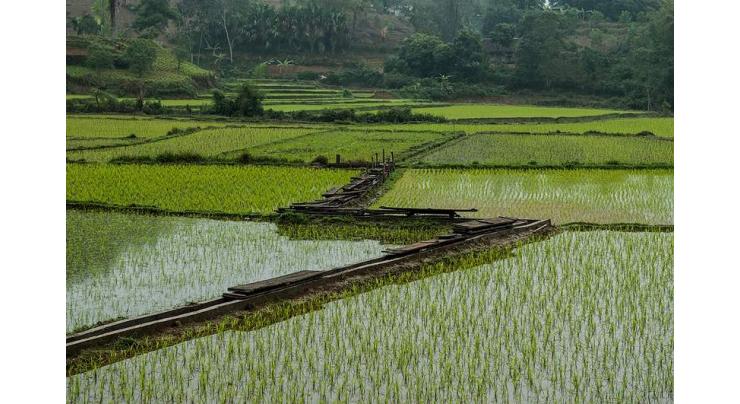
Need For Modern Technology Use In Agriculture Stressed
Rukhshan Mir (@rukhshanmir) Published February 14, 2018 | 07:38 PM

Use of modern techniques and technologies in Agriculture is the need of the hour which carries equal significance for both the businessmen and the men of science and technology
LAHORE, (UrduPoint / Pakistan Point News - 14th Feb, 2018 ) :Use of modern techniques and technologies in Agriculture is the need of the hour which carries equal significance for both the businessmen and the men of science and technology.
It was upshot of the speeches delivered at a seminar on 'High Value Agriculture' held here at Lahore Chamber of Commerce & Industry on Wednesday. The LCCI President Malik Tahir Javaid, Ceo Yuksel Seeds, Turkey Yaqub Yuksel, Convener LCCI Standing Committee on Mechanized & High Value Agriculture Mian Shafqat Ali, Ex-vice Chancellor Arid Agriculture University, Rawalpindi Dr Rai Niaz Ahmed, Dr Khawaja Asif, Mian Shaukat Ali, Faisal Iqbal Sheikh and Naeem Hanif also spoke on the occasion.
The experts said that there was a dire need for reforms in agriculture sector and addition in cropped area as country could not afford to stay where it was today in terms of cropped areas and per hectare yield because it was already running well short of per capita food availability.
They said that yield gap in the four major crops of Pakistan was three times from the best producers in the world such as China and Egypt. They said that low yield had contributed to the poverty in rural areas besides forcing country to import agriculture produces to feed its population.
Malik Tahir Javaid said the agriculture sector of Pakistan continued to be the single largest and dominant driving force for growth which contributed almost 19.5 percent in Gross Domestic Product.
It was the main source of livelihood for 42.3 percent of total labour force despite the fact that agriculture mechanization in Pakistan was very limited. He said that area under cultivation for important crops accounted for 23.85 percent of the value added in overall agriculture.
Wheat accounted for 9.6 percent of the total value added in agriculture and cotton production was 10.67 million bales. For the sake of increasing the share of agriculture sector in GDP, the existing area of cultivation had to be increased on war-footing.
Malik Tahir Javaid said that due to lack of technology usage in agriculture sector, we face the problem of crops yields gaps. The average yields production in the agriculture sector of Pakistan was far below the level of those countries that used the technology in their agriculture sector, he said, citing that level of yields of different crops was 50 to 83 percent lower than the average of other countries of the world.
He said the prospects of Pakistan's economic prosperity heavily depended on the performance of agriculture sector. It had to be evaluated that government was giving subsidy to farmers at various stages of purchasing fertilizers, pesticides, seeds as well as selling their output at support prices but still this sector had not succeeded in enhancing the level of productivity.
He said that in the present scenario of water scarcity, the sustainable food security of Pakistan had to be ensured by way of adopting new techniques. "There are many developing countries like Pakistan which are encouraging corporate farming and in parallel to that they are fostering high value agriculture that include vertical farming, hydroponics farming, aquaponics farming and arctic farming etc.
If government helps the farmers in acquiring these technologies at affordable prices then it is highly likely that new employment opportunities will be created and the productivity will also increase." Mian Shaukat Ali said that Chamber of Commerce and Industry played an important role to promote agriculture sector of any country.
All Chambers of Commerce and industry of Pakistan should pay attention to agriculture so that they could highly contribute in development of this sector. He said that another problem of agricultural sector was lack of agricultural graduates or their non-seriousness towards agricultural developments, adding that had they worked for the development of this sector seriously it would be beneficial for the country.
Related Topics
Recent Stories

Mired in crisis, Boeing reports another loss

Session Awarding Ceremony 2024 held at Cadet College Muzaffarabad

Austrian ski great Hirscher to make comeback under Dutch flag

Pakistan, Japan agrees to convene 'Economic Policy Dialogue'

FM Dar conveys deepest sympathy on torrential rains devastation in UAE

Spain PM Sanchez says weighing resignation after wife's graft probe

Tennis: ATP/WTA Madrid Open results - 1st update

Long-lost Klimt portrait auctioned off for 30 mn euros

Osaka seals first win on clay since 2022 in Madrid

Earthquake jolts Karachi

Sindh minister orders operation after attack on police in Ghotki

TikTok to fight US ban law in courts
More Stories From Agriculture
-

MNAs for favorable wheat procurement terms to benefit farmers
3 hours ago -

Farmers should preferably complete cotton sowing by May 15, say experts
5 hours ago -

Livestock dept, PCS to hold poultry expo from April 30
7 days ago -

Farmers advised to adopt pre, post harvest management for wheat crop
8 days ago -

Farmers must complete all arrangements prior to wheat harvesting
11 days ago -

Wheat Harvest: Agri deptt issues certain guidelines
11 days ago
-

1,800 agricultural equipment to be provided to 710 farmers: secretary
18 days ago -

Steps must be taken for promotion of agriculture sector in Balochistan: Qadir
18 days ago -

Govt working to increase agriculture production in merged districts: KP Minister
19 days ago -

Commissioner chairs meeting to discuss wheat procurement target, other matters
22 days ago -

Vital for economy, agriculture sector to be uplifted on priority basis: Minister
1 month ago -

Advisory for wheat growers
1 month ago











